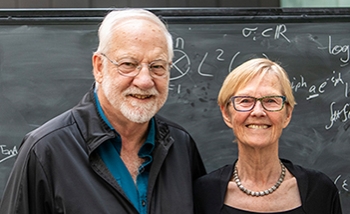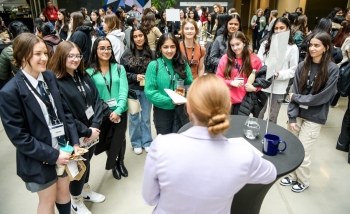Science: GR @ 100
Perimeter Faculty member and author Lee Smolin examines the singular mind of Albert Einstein and finds a master storyteller.
 Contrary to popular belief, though, Einstein wasn’t working alone. His great breakthrough of 1915 was aided by a host of friends, colleagues, and competitors.
Contrary to popular belief, though, Einstein wasn’t working alone. His great breakthrough of 1915 was aided by a host of friends, colleagues, and competitors.
After 100 years, where is general relativity going? Three Perimeter faculty – Luis Lehner, Avery Broderick, and Robert Myers – look to the next 100 years of GR and its implications for gravitational astronomy, black hole research, and holography.
Science: Noether’s theorems
 Emmy Noether was a brilliant German mathematician whose insights continue to underpin physics. Pity most people haven’t heard of her.
Emmy Noether was a brilliant German mathematician whose insights continue to underpin physics. Pity most people haven’t heard of her.
For researchers today, Noether is a guiding light. She is the namesake of Perimeter’s Emmy Noether Visiting Fellowships, which aim to address and help change the under-representation of women in physics. Emmy Noether Visiting Fellow Sarah Shandera shares her own story and her perspectives on the work that still lies ahead.
Science: General
For Perimeter Director Neil Turok, the last century of physics was just the beginning. He explains why we’re at the dawn of a new golden age.
Perimeter Board Member Art McDonald had a stellar year, sharing both the Nobel and Breakthrough prizes.
 Convergence brought together 250 theorists and experimentalists, and challenged them to not only seek answers, but to find new questions.
Convergence brought together 250 theorists and experimentalists, and challenged them to not only seek answers, but to find new questions.
One of the newest Perimeter Research Chairs, Pedro Vieira, continues his quest to equip young researchers with the tools for analytics success.
General:
 Chalkboards are everywhere at Perimeter, but one became the centre of attention when Perimeter’s first artist-in-residence, Alexa Meade, created a perception-bending blend of art and physics.
Chalkboards are everywhere at Perimeter, but one became the centre of attention when Perimeter’s first artist-in-residence, Alexa Meade, created a perception-bending blend of art and physics.
Particles: A compendium of warm welcomes, fond farewells, and new partnerships around the Institute.
From the Black Hole Bistro: Why does your spoon get hotter than your bowl when eating soup? (Bonus: delicious lentil and chorizo soup recipe!)
PI Kids Ask: Why does your stomach drop when you’re on a roller coaster?
About PI
Perimeter Institute is the world’s largest research hub devoted to theoretical physics. The independent Institute was founded in 1999 to foster breakthroughs in the fundamental understanding of our universe, from the smallest particles to the entire cosmos. Research at Perimeter is motivated by the understanding that fundamental science advances human knowledge and catalyzes innovation, and that today’s theoretical physics is tomorrow’s technology. Located in the Region of Waterloo, the not-for-profit Institute is a unique public-private endeavour, including the Governments of Ontario and Canada, that enables cutting-edge research, trains the next generation of scientific pioneers, and shares the power of physics through award-winning educational outreach and public engagement.
You might be interested in


